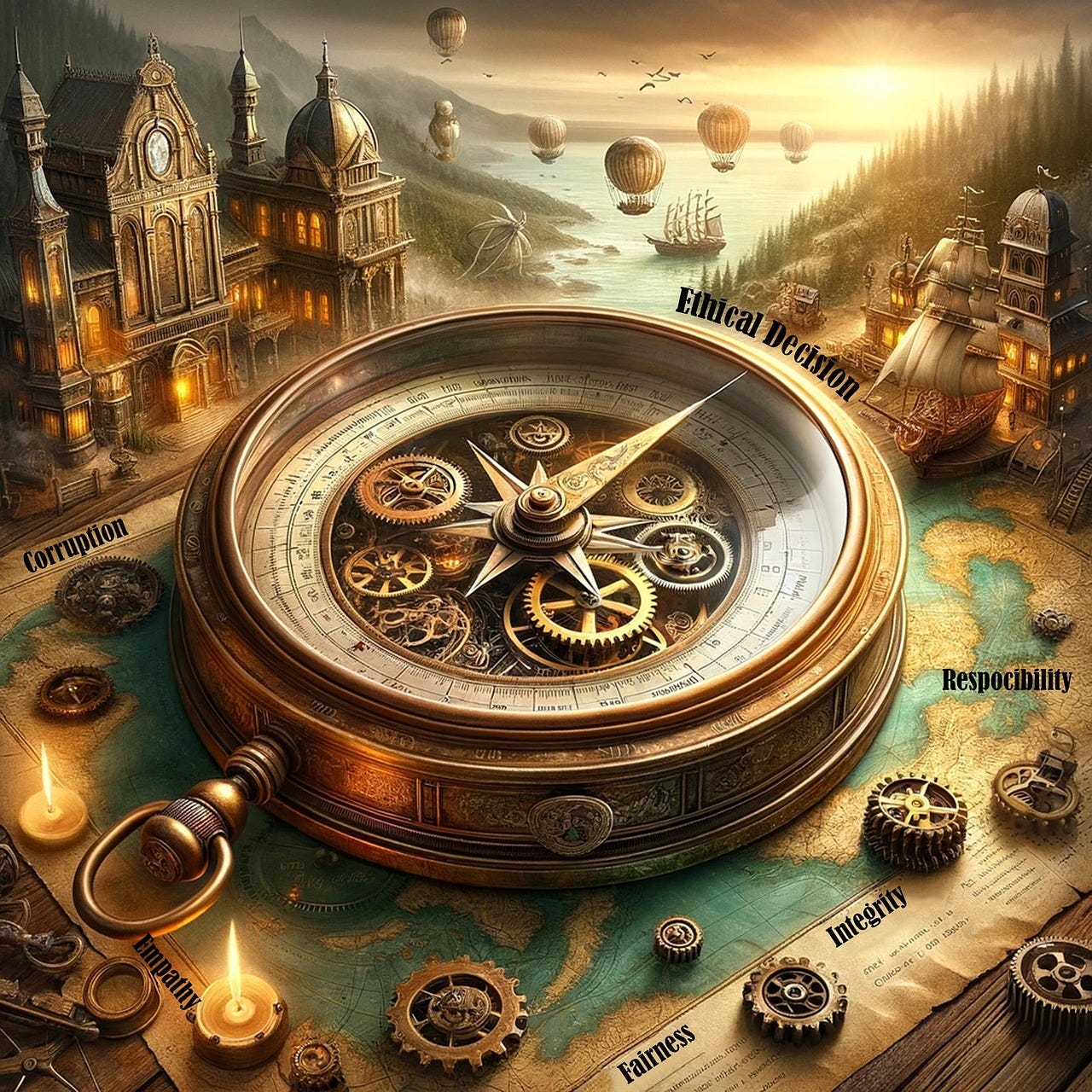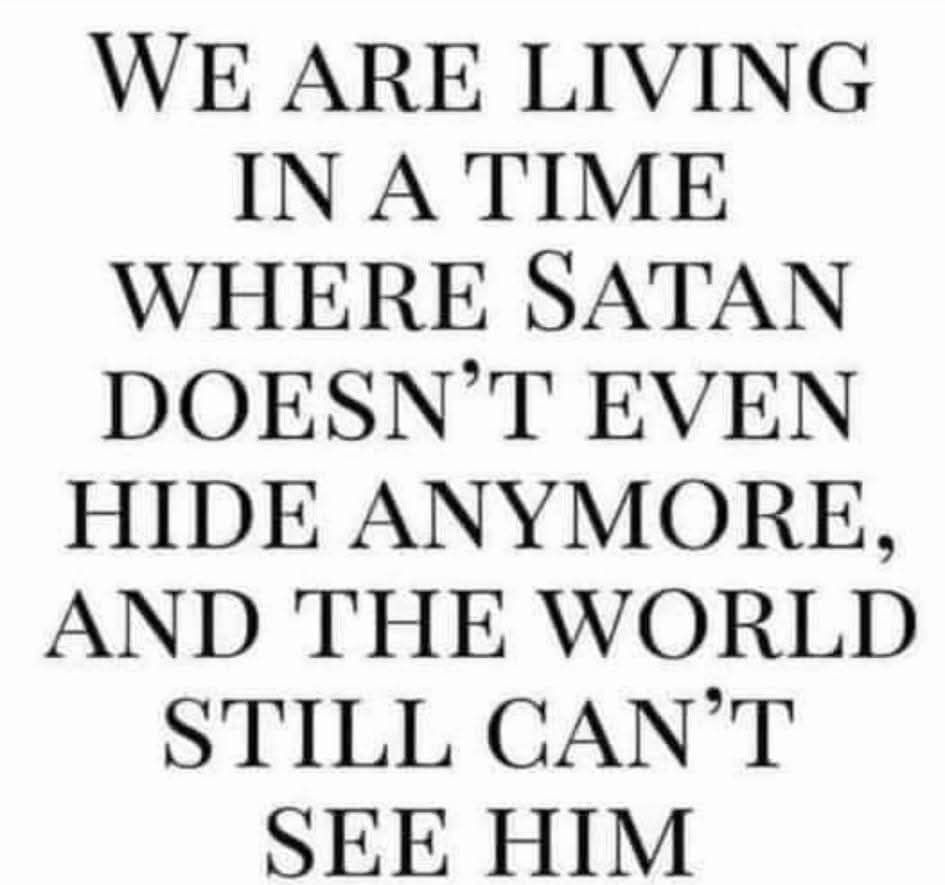We can't overcome evil if we don't recognise evil
Why do so many churches not seem to recognise the evil in the world today?
Can you overcome evil if you can’t even recognise evil?
This is the question I’ve been pondering over the last few days. If we can’t recognise evil as evil, how can we stand against it? This goes double for the church, who should be experts at recognising good and evil.
This has been on my mind since last week, when I read a piece by James Delingpole about how we are engaged in a spiritual battle. Let me quote from his article:
The other reason, as we’ve heard from whistleblowers like Ronald Bernard, is that these Elites are utterly obsessed with the occult, including stuff like ritual sacrifice of children. They do it in homage to the evil deities they worship - the same ones, historically, worshipped by the Canaanites and the Edomites and the Phoenicians and all the other tribal groups that practised child sacrifice. In return, the evil deities grant them their earthly wishes, a bit like the genie in the bottle. They are given power, success, fame, even on occasion special skills that render them superhuman, as former Illuminati bloodlines hitman Nathan Reynolds explained on a podcast we did together. Are these evil deities just figments of the Cabal’s wicked imagination? Well maybe. But if they are, these non-existent beings have a pretty damn powerful placebo effect…
After reading the piece, I watched the linked interview with Ronald Bernard. He was a top financier who was involved in a lot of shady practices like money laundering. Although he wasn’t in the very top layer himself, he was in communication with those at the top. He said that their religion was quite explicitly Luciferian — they didn’t hide it. The moment his conscience really kicked in, which ultimately led to him leaving, was when he was asked to participate in a ritual child sacrifice. (He said they do this so they have something over you, blackmail material, something they can control you with.) I know it’s hard to believe that this kind of thing would go on, but I see no reason to distrust what he said.
All Christians would (I hope) agree that we are engaged in a kind of spiritual battle: it is what the Bible says, after all. At the same time, I fear that many Christians see the spiritual battle as something which is a long way away — far distant from our lives. They don’t like to think about elites worshipping Satan, conducting ritual child sacrifices, and the like. They don’t like to think that some of the people known to us could be involved in this. It’s much better simply to imagine that everybody is nice, even if they’re not Christian, to assume the best motives of everybody, and to dismiss (or simply not listen to) the testimonies of people like Ronald Bernard.
The problem is, if you do think that everybody is nice — to the exclusion of all the evidence — will you be able to resist evil in your own life / church, let alone the world?
The importance of recognising evil
Paul says in 2 Corinthians:
And I will keep on doing what I am doing in order to cut the ground from under those who want an opportunity to be considered equal with us in the things they boast about. For such people are false apostles, deceitful workers, masquerading as apostles of Christ. And no wonder, for Satan himself masquerades as an angel of light. It is not surprising, then, if his servants also masquerade as servants of righteousness. Their end will be what their actions deserve.
2 Corinthians 11:12-15
In this context, Paul is talking about the false teachers who had infiltrated the church in Corinth. They were “false apostles”, yet they were “masquerading as apostles of Christ”. One of the things which stuck with me from my days at Bible college was being taught in my pastoral leadership classes: “false teachers don’t come with a name badge.” False teachers are inherently deceptive — that’s what gives them their power. They pretend to be teachers of the gospel while at the same time undermining the gospel.
This should be no surprise to anyone who is familiar with the way Satan works. Paul goes on to say that they are simply copying their master, Satan, who “masquerades as an angel of light”. Satan obviously doesn’t present evil to us as evil. How would anybody be led into evil if it was presented to us as it really is? Instead, he is a master of deception — he presents evil to us as if it were good. He makes evil seem to be attractive. It’s been that way since he tempted Adam and Eve in the Garden of Eden.
Given this, it’s vitally important for Christians to have a sense of good and evil — a moral compass. Because evil almost never comes to us in its true colours, we need to be trained in the ways of righteousness so we can recognise it for what it is. This training primarily comes from Scripture — reading it, meditating on it, living it out, in the power of the Holy Spirit. This is what Paul says elsewhere:
All Scripture is God-breathed and is useful for teaching, rebuking, correcting and training in righteousness, so that the servant of God may be thoroughly equipped for every good work. 2 Timothy 3:16-17
Paul says that Scripture will train us in righteousness — that is, train us to know the difference between good and evil, to know how God wants us to live. The more you know the Bible, the more you should know how to distinguish good from evil.
I would go as far as to say that recognising evil is one of the most fundamental things that the Christian life is all about: we sinful human beings by nature don’t have a highly-developed moral compass; we need to be trained over time by reading God’s word and seeking his will.
Think about the effect it would have to be daily reading words like this from Psalm 101:
I hate what faithless people do;
I will have no part in it.
The perverse of heart shall be far from me;
I will have nothing to do with what is evil.Whoever slanders their neighbour in secret,
I will put to silence;
whoever has haughty eyes and a proud heart,
I will not tolerate.Psalm 101:3-5
When we read words like that, God uses them in our hearts to help us feel the same way: God helps us to love righteousness and hate evil.
Long-time followers of Sacred Musings will probably roll their eyes at this point because I speak about this so much, but I will keep banging the drum about it! I truly believe that the Psalms not simply another part of Scripture but are there for our spiritual formation. In a nutshell, I recommend reading a Psalm every day. Just read one with your daily Bible reading. Do that for a few months and you will be surprised at the effect it will have.
Notice that the Psalm doesn’t simply talk about David’s own personal life, he also talks about recognising evil in others. He knows that to condone someone else’s evil, when he had the opportunity to speak out about it, would make him complicit in evil. This is another key aspect of recognising evil: it’s not enough simply to say “I will avoid evil personally” — although that IS important — but we also need to say “I will not tolerate evil on my watch”. Obviously there is much evil in the world which we can do nothing about, but where we have opportunity (as parents, for example), we must not tolerate it.
So, we’ve seen so far that knowing the difference between good and evil is fundamental to being a Christian. This is something we are trained in over time, primarily by the Holy Spirit speaking to us as we read the Scriptures.
So, let me turn to another question: why is it that so many Christians and churches don’t seem to recognise the evil in the world today?
Why do so many Christians not recognise evil?
As I’ve explained several times on Sacred Musings, I wasn’t really awake to the kind of issues I talk about here until 2020. It was really covid and lockdowns that opened my eyes to the evil happening on a grand scale in the world. However, as I began to research all these things, what became abundantly clear to me is that many Christians I knew didn’t see things the same way that I did. In fact, it felt like we were living in different worlds. In so many ways, I felt like an outsider! (I know many of you felt the same way). A lot of Christians in the established church saw no problems with churches closing for months on end, and even when churches came back together to wear masks and not sing hymns. They didn’t see the problems when people were told to be vaccinated or lose their jobs, or when even children and pregnant women were being coerced into getting the vaccine — to name just two examples of many.
Why was it that so many Christians didn’t recognise evil when it came? It’s clear a complex and multifaceted issue, and I’ve tried to explore many of them on Sacred Musings over the last few years (e.g. last year’s podcast series on Os Guinness’ book The Gravedigger Files). However, there is one particular issue which gets us to the root of the problem and I want to focus on that today.
I’m going to quote from a book by Carl Trueman called Grace Alone. The book itself is excellent, but one thing he said has particularly stayed with me since I read it. This comes from the conclusion, where he is talking about what a church looks like that takes the doctrine of ‘grace alone’ seriously:
A Grace-Alone Church Takes Sin Seriously … our basic problem is not that we have low self-esteem. It is not the myriad problems that afflict ordinary people on a day-to-day basis — grim jobs, failing marriages, unhappy home situations. It is that in Adam we have all sinned, that we stand guilty before a holy God, and that our hearts in themselves are committed to rebellion against him and his rule … A church that takes grace alone seriously will be known for the fact that she takes sin seriously. Her ministers will preach the holiness of God and call people to repentance weekly. The hymns and songs will reflect this reality, and the prayers will address humanity’s guilt before God. No grace-filled church will be unclear about the problem grace is meant to address.
One of the things I’ve realised over the last few years is that the majority of churches across the country are NOT like what Trueman describes. They, in a word, do not take sin seriously. And what is ‘sin’ but another way of saying, ‘evil’? Many churches seek to deal with the problem of sin either by minimising sin (“you’re not a bad person”), or by maximising forgiveness (“God will forgive you anyway”). Most churches don’t like to dwell on God’s holiness and the standards God requires of us. Most churches don’t like to preach about hell, or God’s wrath, or how “without holiness no one will see the Lord” (Hebrews 12:14).
Note: I’ve spoken about this several times recently on Understand the Bible as I was preaching through the Old Testament book of Lamentations. You can catch the whole series on this YouTube playlist.
I fear that even churches which claim to prioritise the Bible gloss over these things: it is possible to preach a sermon on a passage that mentions hell without warning people that hell is a fearful reality which we must take seriously. I think a lot of churches in the tradition I come from tend to ‘intellectualise’ these things — that is, preaching the Bible as a sort of academic system which we must comprehend with our minds, rather than something which must penetrate our hearts and change our actions.
So, what happens when churches don’t take sin seriously? They lose the ability to distinguish good and evil. If you can’t recognise the sin and evil in your OWN heart, how can you recognise it in anyone else’s? If you don’t know how strong the power and corruption of evil is, how can you understand the power it can have over others?
I honestly believe that this is exactly what has happened with the church today. It has simply lost the ability to recognise evil. This is why, for example, when I used to try and talk to people about the vaccine mandates or the problems with lockdowns and so on, many Christians would shrug their shoulders at it. They couldn’t even begin to see anything wrong with it.
Or at least, they didn’t see anything evil about it. One of the things which I’ve realised is that a lot of Christians seem to have invented a kind of third way in between good and evil, which they might call ‘honest mistake’ or ‘politics’ or something like that. It’s a convenient way to excuse bad behaviour: it’s not really evil — even if it’s not good, it’s explainable some other way… in adopting other categories of thought like this, the church nullifies the Word of God and effectively renders the gospel meaningless.
Note: I found this, for example, when trying to convince people about Nigel Farage. “Oh yes”, they might say, “it wasn’t right what they did to Rupert Lowe. But that’s just politics!”
How we overcome evil
In Carl Trueman’s book I quoted from just now, he went on to explain how churches which take sin seriously take Jesus seriously: Jesus is God’s solution, God’s only solution, to the problem of human sin. A serious problem needs a serious solution. Churches who do not take the problem of sin seriously therefore do not take Jesus seriously.
The principle here is clear: if we don’t agree on the problem — in this case, the problem of our sinfulness being offensive to a holy God — then we will not agree on the solution. If you apply this to what’s happening in the world, if we don’t agree on the problem — that there is great evil going on from the top down — then we will not agree on the solution. This is what I have been trying to say here for a while, e.g. in this podcast:
I fear that a lot of Christians have bought into the lie that we need a political solution to the problem, rather than a spiritual one. But the sober reality is that only light can overcome darkness; only good can overcome evil. Trump may have been better than Kamala Harris (I mean, a stick of wood would have been better than Kamala Harris so not a high bar…), but that doesn’t mean he’s on the side of the light. Similarly, Reform may be better than the Conservatives or Labour, but they are not on the side of the light.
As Jesus said:
I have come into the world as a light, so that no one who believes in me should stay in darkness. John 12:46
If we truly belong to Jesus, we shouldn’t stay in the darkness but come into the light. I would argue this involves recognising the evil in the world for what it is and staying away from it. That doesn’t mean there isn’t room for people who haven’t ‘woken up’ yet — I was asleep for a long time until 2020 — but I do believe that those who are mature in Christ need to be taking an active stand against the evil in the world.
I also believe that this is going to require churches to radically alter the way they are operating. Many churches still seems to be based on a Christendom model, where everybody basically shares Christian values and assumptions. They are not making disciples, they are not teaching people to take up their cross and follow Jesus, they are effectively allowing people to play at being Christian while keeping their old lives intact. I spoke about this at greater length in this video:
The point I am making here is that only clinging to Christ, the Light of the World, can overcome the darkness. If people are keeping Christ at a distance, then they won’t really overcome the light. And if churches are permitting or even encouraging people to keep Christ at a distance, then they will never overcome the darkness.
All this brings us back to the question I’ve been asking for a while now about separation.
What fellowship does light have with darkness?
Do not be yoked together with unbelievers. For what do righteousness and wickedness have in common? Or what fellowship can light have with darkness?
2 Corinthians 6:14
This is a verse I’ve come back to a lot lately. Paul’s words about being “yoked together” come from farming: two oxen would be yoked together so they could plough a field without both wandering off in the wrong direction.
Paul has chosen this image deliberately. What he means is that it is impossible to do the same work if we are pulling in different directions. If one church believes the true gospel and one ‘church’ does not, then they cannot work together. As Paul says, what fellowship does light have with darkness?
Which brings us back to the issue at hand. If churches do not recognise the darkness in the world for what it is, is it possible to work together with them? If they are not standing up against the evil in the world, are they part of the solution or part of the problem?
I spoke previously about the need for separation here:
One of the things I’ve appreciated since started Sacred Musings is connecting with people who are ‘awake’ to what’s happening in the world. As I said earlier, my experience in traditional Christian circles has been a very isolating one, so it’s been great to connect with others via the internet.
But I think the time has come for Christians to take more of a stand. I believe we, as Christians, need to be prepared to stand up and say: this is not simply ‘not ideal’, or whatever other words we might choose to excuse it. What’s happening is evil, and we will publicly stand against it and have no part in it. If your church does not like this message, and wants you to be quiet — then shake the dust off your feet and go somewhere where the message will be welcomed.
I’ve spoken for long enough at this point but in a future post I will return to this topic and outline a few concrete steps and pointers for what it might mean to separate and how we know when the time is right. But I’d love to hear your comments in the meantime, please do leave your thoughts below!
If you use Telegram, do join the Sacred Musings channel.
If you appreciate Sacred Musings, you can help me out in a few ways: 1. Becoming a subscriber - free or paid; 2. Sharing Sacred Musings on social media or with anyone you think might like it; 3. If you’d like to contribute to help keep this running but becoming a paid subscriber is not the right option for you right now, you can give one-off via PayPal. Thank you so much!









This is all very true about the nature of evil, and why we need to strongly condemn it wherever it lies.
Learning about the Elite performing Satanic rituals is the thing that woke me up completely to the reality of evil and thus the contrasting good and truth of Jesus. Many on the right still think of these powerful people as misguided or incompetent rather than participating in true spiritual evil. Becoming aware of this has really honed my intuition for seeing evil in all of its forms, and much of it I was previously asleep to; I want this same awareness for all Christians, because I think intuition is heavily attacked by our modern culture, and it is one of our strongest weapons against darkness.
Our society has become so lost in the moral “grey area” that it invented, that everything is now grey and we can’t recognize the black and white. While our world preaches acceptance, we are drowning in apathy towards things that should be rending our hearts. As Christians, we have to be on the side of truth, and that means recognizing and refusing to abet evil. We can’t allow ourselves to be comfortable in our ignorance.
This topic has strongly been on my mind and heart recently, so I’m glad to see you thinking about it as well. A huge question for me right now is what it means, in practice, to be truthful and righteous, and if it’s worth doing even when it is difficult and divisive. This is where I think about the need for separation at times. Lots to balance.
Sorry for my long-winded comments, but I appreciate your writing & it always gets me thinking as well! Thank you!